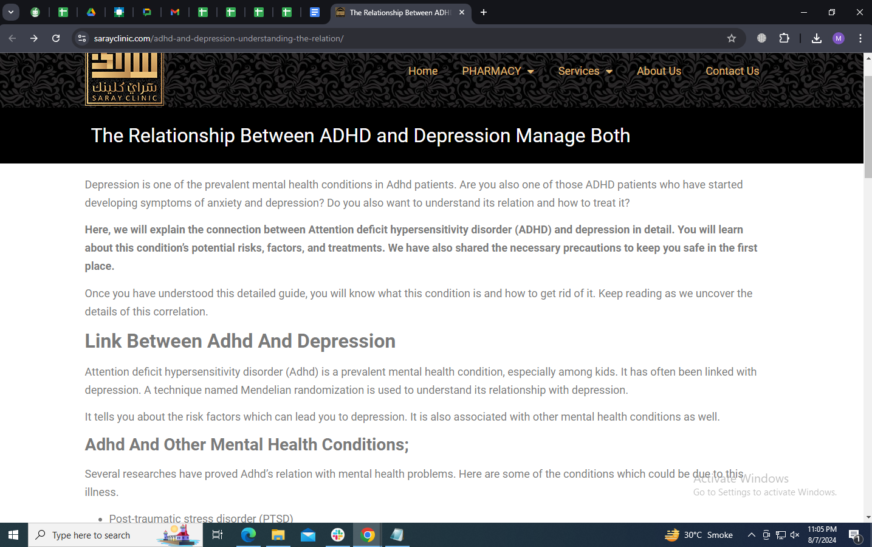Although getting mental health care is essential for general wellbeing, many people face major obstacles when trying to get the support they need. These obstacles may seem as unwillingness, resistance, or open rejection to using mental health services. Improving the efficacy and accessibility of mental health care requires an understanding of the causes of this resistance and the investigation of strategies to overcome it. This article explores the causes of resistance to mental health services and provides solutions for these problems.
Recognizing Misconceptions and Resistance to Mental Health Care
Stigma is one of the biggest obstacles to receiving mental health care. People who experience mental health concerns may fear judgment or mockery because of societal norms that often depict them as a sign of weakness or personal failure. When people internalize this stigma, they may minimize their problems or decide not to ask for assistance at all. Reluctance is further exacerbated by misconceptions regarding mental health, such as the idea that therapy is solely for “serious” illnesses or that taking medication will drastically alter a person’s personality.
A fear of being exposed
In order to receive mental health services, people frequently need to face and communicate their innermost anxieties, traumas, and phobias. This susceptibility can be frightening, which makes people resist. Individuals may be afraid of being misinterpreted or judged, or they may think that talking about their experiences will make their issues seem more serious or overpowering. For many people, opening up to a therapist or counselor can seem like an impossible task.
Past Adverse Events
One’s willingness to seek treatment might be strongly influenced by their prior encounters with mental health services. People may be reluctant to try again if they have had poor encounters with therapists, been ignored, or had ineffective therapies. This may lead to a cycle of avoidance in which unfavorable prior experiences strengthen a person’s aversion to receiving care in the future.
Practical and Financial Barriers
The expense of mental health services can be high, and not everyone has sufficient insurance. Co-pays and out-of-pocket costs can be burdensome even with insurance. Practical obstacles can also deter people from getting help, such as locating a qualified therapist, making travel arrangements, or juggling appointments with obligations to one’s family and job.
Social and Cultural Aspects
Resistance to mental health care can also be significantly influenced by cultural beliefs and societal standards. Mental health problems could be viewed as a personal problem or a moral failing in some cultures. An individual’s inclination to seek professional assistance might be influenced by societal norms, family expectations, and traditional ideas about mental health. Language obstacles and a lack of care that is sensitive to cultural differences can also make it more difficult for people to get the treatments they need mental-health-care.
Insufficient Knowledge and Comprehension
Some people experience resistance as a result of ignorance regarding mental health issues and their treatment options. People may not be aware of the signs of mental health problems or that there are efficient therapies accessible. The idea that mental health issues are unsolvable or that assistance is not required may result from this ignorance.
Techniques for Surmounting Opposition via Awareness and Education
Fighting stigma and misconceptions about mental health requires raising awareness and educating others about it. Campaigns for public awareness, educational initiatives, and candid discussions can all contribute to the normalization of mental health concerns and the idea that asking for assistance is a show of strength rather than weakness. Education can help debunk misconceptions regarding mental health therapies and draw attention to the wide variety of efficient solutions that are accessible.
Increasing Confidence and Lowering Shame
Overcoming opposition requires establishing spaces where people feel heard and comfortable. Mental health practitioners can actively listen, empathetically communicate, and validate people’s experiences in an effort to foster trust. Reducing stigma and increasing the accessibility of mental health treatments for a variety of communities can also be achieved through training and education for clinicians on cultural competency and sensitivity.
Resolving Practical and Financial Obstacles
Reducing the practical and budgetary obstacles can have a big impact. This could entail promoting improved insurance coverage for mental health therapies, establishing sliding scale costs, or offering child care and transportation assistance. Additionally, for those who find it difficult to get in-person care, telehealth services might provide more flexibility and convenience.
Promoting Community and Family Support
Family and community support can be very important in motivating people to ask for assistance. While community organizations can give services and create friendly environments, family members can offer encouragement and helpful advice. Peer support groups can be helpful as well since they provide people the chance to interact with others who have gone through similar things.
Encouragement of Early Intervention and Self-Care
Promoting early intervention and self-care can help stop mental health problems from getting worse. Encouragement of constructive coping mechanisms, stress reduction methods, and frequent mental health check-ins can provide people the confidence to take charge of their own wellbeing. Early intervention can also assist people in getting care before problems worsen, which lowers the likelihood that they won’t ask for assistance later.
Customizing and Adapting Methods
Since every person’s experience with mental health is different, mental health treatment should be individualized and customized to fit individual needs. Together with patients, providers can design treatment programs that reflect their values, goals, and preferences. Individuals’ unique obstacles and concerns can be addressed with the support of therapy alternatives and approaches that are flexible.
In summary
A multimodal strategy that tackles the root reasons of reluctance and resistance is necessary to navigate resistance to mental health care. We can enhance access to mental health services and assist people on their path to wellbeing by comprehending the elements that lead to resistance and putting methods in place to get over these obstacles. Key elements of developing a more approachable and encouraging mental health care system include education, developing trust, providing practical help, and providing individualized care. We can assist people in overcoming resistance and embracing the advantages of receiving mental health care by promoting an atmosphere of empathy and understanding.
Feel free to submit more guest posts through Links Building Servcies - Best Prices. Buy Author Account / 1$ Guest Post Here






















